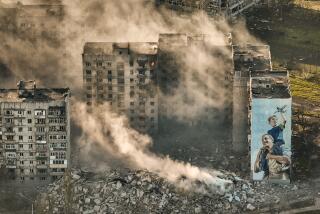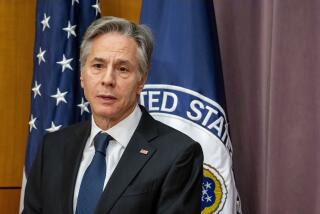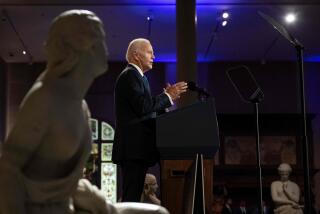Russians Don’t Expect Much From Clinton Trip : Summit: President has little to offer besides moral support. His priority will be trying to shore up economic reforms.
- Share via
MOSCOW — After lashing back at Western-guided reformers in their parliamentary elections, Russians will take a skeptical first look at President Clinton this week as he visits the former Communist empire that the West had pledged so grandly to remake.
Hardened by two years of promise and frustration, Russians don’t expect much.
Nor does Clinton have much to offer beyond a new slogan of moral support during three days of talks with President Boris N. Yeltsin. Mindful of budget restraints at home, growing resentment here of foreign advice and Moscow’s delays in using money already set aside, the White House has announced that there will be no new aid package this time.
Planned as a celebration of the free-market reformers’ expected triumph in a democratic new Parliament, the summit has become a pause for sober reflection by both leaders over how to preserve Russia’s still fragile transformation--Clinton’s top foreign policy priority--in the wake of stunning election gains last month by neo-fascists and Communists.
“This visit manifests a new period--a partnership without illusions,” said Vladimir P. Lukin, Russia’s ambassador to the United States. “We should stop behaving as a couple that vacillates between passionate kisses of love and equally passionate irritations over presumed betrayal.”
Lukin, who was elected to the Parliament as a moderate reformer and will soon leave his diplomatic post, said in an interview that the new period should be characterized by a search for Russia’s “own unique approach to economic reform” and a greater independence from the West.
It is a proud sentiment voiced these days by many Russians who accepted Western-prescribed market reforms launched in early 1992. Billions of dollars in promised Western aid barely materialized, and they instead received the pain of high inflation, creeping unemployment and troubling rates of homelessness and crime.
The souring of Moscow’s expectations--after thunderous applause for Yeltsin in the U.S. Congress in June, 1992, and three upbeat summits with Presidents George Bush and Clinton--was dramatized on Dec. 12 when hard-line opposition parties that view the United States as an enemy won 45% of the vote here.
Vladimir V. Zhirinovsky, the neo-fascist whose movement rode the backlash to a first-place finish, said Thursday that Clinton ought to stay home and “play his saxophone.”
“All of you in the West have become rotten and moldy,” he said. “You want us to be weak and to rot together with you. . . . Rot without us.”
On Saturday, however, Zhirinovsky took on a conciliatory tone. In an interview with CNN, he insisted he seeks to cooperate with world leaders and even said he has a “good opinion” of Clinton.
Russians interviewed at random in Moscow last week seemed to regard Clinton with the same skepticism they hold for their own politicians. While it is fine for him to come shake Yeltsin’s hand and learn about their country, many of them said, it would not reverse the post-Communist decline in their living standards.
“Maybe in the future something will result from this visit, but as of now I see no reason why I should feel exultation,” said Lidia A. Larina, 37, a teacher who lost her job last year in a budget cutback. “As for reforms, maybe Russia has gained from them, but I can’t see what.
“Anyway,” she added, “the United States and its President cannot be blamed for the poverty in Russia. It is we who must solve our internal problems.”
Radical free-marketeers, who got 16% of the Parliament vote, say the do-it-yourself mood is a healthy sign that Russians are learning to take personal responsibility after seven decades of communism and two years of excessive faith in Western aid.
But the radicals’ immediate problem is how to save their policies and jobs. Since mid-1992, they have been thwarted by a conservative faction of the government that opposes rigorous anti-inflation conditions set by the International Monetary Fund on the bulk of Western credits and that has repeatedly violated them.
The radicals under Economics Minister Yegor T. Gaidar, who designed the reforms, say the biggest threat to Russia is inflation--about 900% last year.
Inflation, they say, has been caused by the government exceeding IMF targets on state spending to bail out money-losing industries. They say the sooner those industries are forced to close, the sooner the economy can be restructured and stop shrinking.
Conservatives, led by Prime Minister Viktor S. Chernomyrdin, see a greater threat in mass unemployment. To avoid politically risky factory shutdowns, they argue that the West should aid a more gradual transition to the free market--high inflation and all.
Largely because the Cabinet is too divided to pursue a consistent strategy, promised aid has stalled. The IMF, for example, is holding up a $1.5-billion credit agreed to last summer and a standby loan of several billion dollars because the government has failed to close a huge budget deficit.
And Russia has yet to use a $70-million loan approved last year by the World Bank to set up an unemployment benefits program--the first step of a planned Western-aided “social safety net” to ease the pain of reform. This is because the Russian Finance Ministry has clamped down on borrowing that doesn’t generate a cash flow.
After voters rebelled last month, Yeltsin was urged to choose between the government’s rival factions, but there is no sign he has done so. Both Gaidar and Chernomyrdin are expected to keep their jobs in a long-delayed Cabinet reshuffle--an apparent recipe for more deadlock.
Amid conflicting signals from his Administration, Clinton appeared to come down on the side of the radical reformers Wednesday when he endorsed “more attempts to build a safety net to deal with consequences of reform (in Russia) but not an attempt to slow down the reform effort.”
But unless it is attached to new funds for social spending, Russians may ignore such advice. Clinton himself characterized his “more reform, more therapy” prescription as a “bumper sticker” about the way his Administration feels about Russia.
To hear Clinton repeat that slogan loud and clear in Russia is the best the radicals can hope for after an election that left them badly wounded. “It’s more important what he says than what he provides in actual money,” said Anders Aslund, a Swedish economist on Gaidar’s advisory team.
But if Clinton listens to moderate reformers and centrists in the new Parliament--as he must do to overcome criticism for supporting Yeltsin’s violent closure of the old one--he will hear a wide range of ideas on how to remake Russia, some of which have not been tested.
Clinton is also likely to hear such assertiveness from Yeltsin himself, as the Russian leader stakes out an increasingly independent foreign policy. Yeltsin is expected to argue against an eastward expansion of the North Atlantic Treaty Organization.
But Russians may not be paying attention. Former President Ronald Reagan’s swashbuckling 1988 visit here during the heyday of perestroika and the big-money promises of former President George Bush will be a hard act for Clinton to follow.
“The Russian people will soon start thinking about these summits the way they think about space flights,” said Mikhail Berger, a columnist for the newspaper Izvestia. “It is important, it is undoubtedly an achievement, but it is somewhere way up there, very remote. You can watch it on TV, but it has no consequence in real life.”
More to Read
Get the L.A. Times Politics newsletter
Deeply reported insights into legislation, politics and policy from Sacramento, Washington and beyond. In your inbox three times per week.
You may occasionally receive promotional content from the Los Angeles Times.










